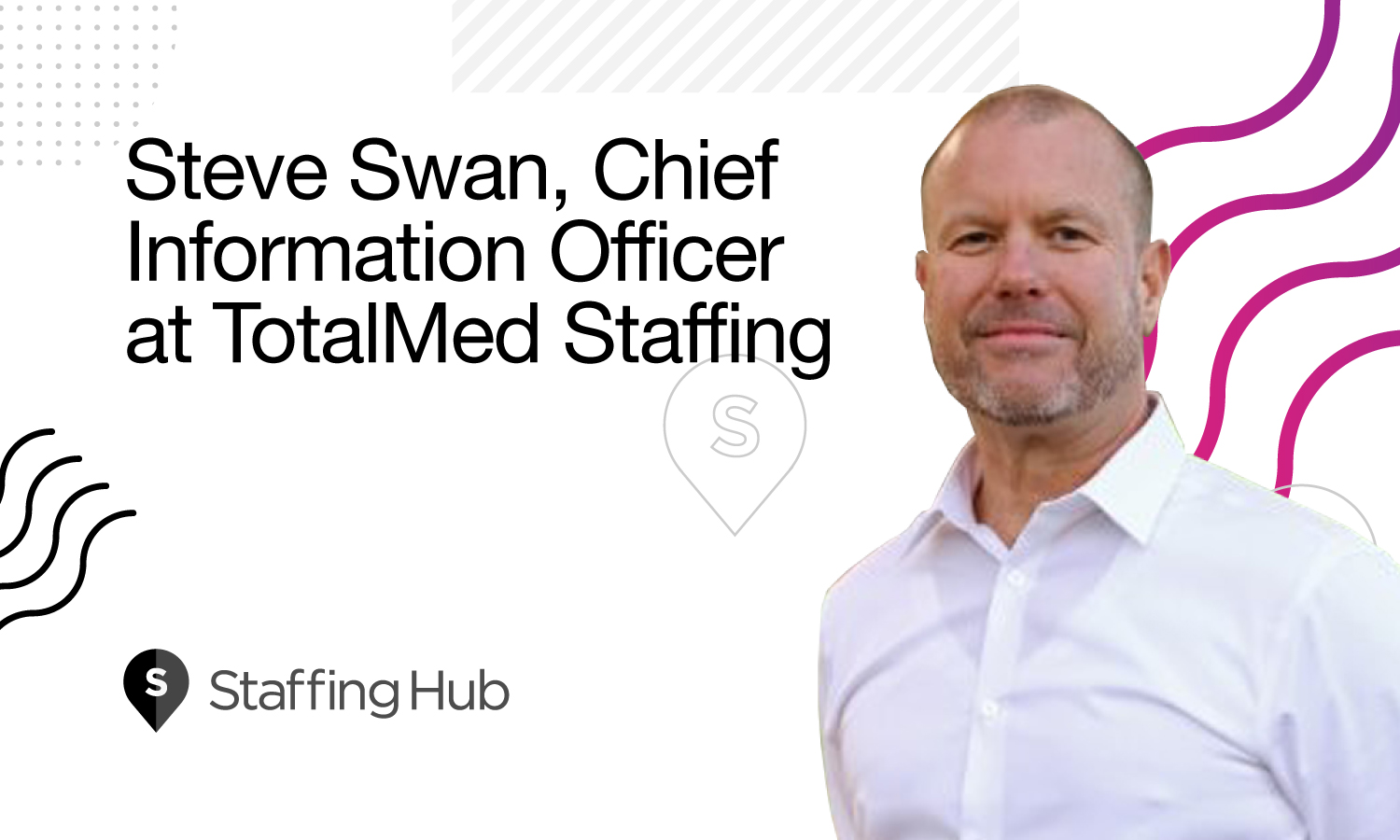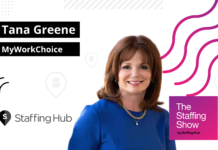
In this episode, Caitlin Delohery, the Editor in Chief of Staffing Hub, interviews Steve Swan, Chief Information Officer of TotalMed about making smart tech choices, recruiting with a personal touch, and what AI really means for the industry.
Here’s the transcript of the episode.
Staffing Hub: So you joined TotalMed after they acquired Valley Healthcare so you have a pretty unique perspective on the company. So tell me a little about TotalMed and what you think differentiates TotalMed as a staffing firm?
Swan: Well, yes, we joined TotalMed in the later part of 2018. A smaller Sacramento company joined a much larger company in Appleton Wisconsin, and it’s been a great union thus far. We’ve brought the best of both worlds together in my opinion.
There are several market differentiators for TotalMed. The most conspicuous are the way that we work with our colleagues that are the workers or clinicians that are deployed to the various faculties or payers.
TotalMed is seemingly in perpetuity being complimented with the way that they hold their relationships, and you can reach anybody 24 hours a day. That I think it’s a very special market differentiator.
The other one is our technology. I would be so bold as to say that our technology surpasses anybody else’s out there. It enables us to respond to that first comment. We built this technology because we care about the relationships we have, and it’s important for us to make sure that we are ahead of the curve with putting clinicians or workers to work and not suffering through delays and making sure they get the jobs that they want.
The dawn is the Rolodex methodology of filling the needs of our clients and putting the candidates to work. That’s a very protracted process.
If our competition is not using innovation to care for their clinicians and workers and colleagues, then they’re pretty far behind.
Staffing Hub: And I think this dovetails right into my next question: what do you see as the top challenges facing the industry as a whole right now?
Swan: It’s pretty disparate, and we’ve got so many technologies that are out there. Just from a pure VMS landscape; the technologies that have been around for quite some time, and those that are coming out today, a lot of the agencies have to either aggregate those, separate and decipher things. It’s something they look differently for this particular facility with respect to nomenclature and protocol that it does for somebody else. So a lot of the agencies are suddenly playing quarterback.
I don’t know if that’s going to get better. Likely the agencies will make it better because they will need to. But they will innovate and invent around those disparities. But other than that, I don’t know that the historical challenges are any different today with finding the right quality candidate to put into the right position at the right facility. But again, I think innovation solves some of those issues.
Staffing Hub: And what are some of the specific guidelines you keep in mind when pushing towards innovation that facilitates relationships?
Swan: You hit the nail on the head with the question. As long as it doesn’t compromise that relationship. There are a couple of ways you can find that equilibrium. You can either balance the relationship with innovation and technology or you can go completely the opposite end and take out that balance in favor of innovation and technology. It’s not our opinion that that’s the most favorable way to approach the relationship. It certainly takes out the personality between the candidate and the agency representing them.
It’s that personal touch. It’s the talking to somebody. It is knowing exactly and precisely what they’re looking for and really asking the right questions that could open up an opportunity that otherwise they might not consider.
You can’t innovate around that relationship. So it’s finding that balance with the technology.
Staffing Hub: Tell us a little about your background because you have a pretty unique perspective on the industry as a whole.
Swan: The biggest influence on innovation in my background is impatience and being relegated to using that somebody give us and says “you must use this” when it’s not necessarily the optimal tool. My background is a wide range of things from developing enterprise-wide application for companies such as Hewlett Packard, even Kaiser Permanente, and a variety of platforms of both application and systems.
You couple all of those things together and it gives me the ability to have a perspective — including 17 years in the staffing industry — putting all those things together to find the right solutions. And it may be something that we can build and it may be something that we can buy. But by putting them all together to make the best solution.
Staffing Hub: And are there any specific tools or tactics that you’d like to share that have been differentiators for TotalMed?
Swan: I’m a big Salesforce fan. There are some older platforms called IBM Domino — and Salesforce reminds me of that platform. You can very quickly build and deploy applications that the company can use on an enterprise level, you can use at a commercial level. It can really take the place of a lot of the manual operations that a company would otherwise go through.
So, Salesforce has really enabled us to build a better platform. We use all custom objects.
We’re very good at the innovation side — recognizing a problem and then building the solution from the ground up.
Staffing Hub: And tell me what you can about your tech stack as a whole? Like what other types of tools does TotalMed rely on to differentiate them?
Swan: Well, I’m a big believer in a common platform, so Salesforce is becoming our common platform, both from an operational perspective and a commercial perspective. But being able to aggregate all the disparate systems is rather unique. It’s a challenge that a lot of companies that are facing today even outside of our industry.
We have been I would say uniquely innovative in taking multiple systems and getting them to talk to each other so that we can be very efficient — from your accounting system to your payroll system to your billing system to your ATS to your marketing platform — making it so we don’t have multiple system that don’t talk to each other, requiring multiple operators, instead, creating our common platforms so that we can all work together.
That’s really what we have done and I think we’ve done it very well. Automating some of the things that really compromise the relationship.
Say our recruiters are spending 20 minutes on administrative operational tasks that otherwise could be spent talking to a candidate about what they’re looking for. Well, let’s automate that piece so that we can nurture the relationship instead of spending that time on administrative tasks.
And I think we’ve done that very very well.
Staffing Hub: So, it sounds like a lot of your tech decisions are built around exactly that around what will facilitate better relationships as opposed to automate just for automation sake. So, I was wondering, looking forward a bit, what disruptive tech — from AI to blockchain — looking towards the future what tech is top of mind for you right now?
Swan: Well, it depends. I think the discussion about artificial intelligence blockchain. In fact, I was at conference … In fact, you were at that conference, as well, Caitlin.
Staffing Hub: I was.
Swan: It was, I would say, the dominant discussion. Although I would contend probably 95% of the audience didn’t necessarily comprehend what they’re were talking about or what they were listening to.
The direction of both [AI and blockchain] I think still remains to be seen. There are only a few companies that have been broached the use of AI and blockchain. We use one company and we have a very good relationship with them.
If you’re able to leverage those technologies, you will be able to use predictive analytics in order to obtain an outcome faster than your competitor.
Marrying those opportunities, creating a marketplace that’s exactly what AI and blockchain is going to do for us. So I hear often agencies or other companies representatives say, we’re going to automate and take out the relationship. It’s killing our business because we’ve automated so much that we can’t have that relationship anymore.
My response is always the same: you’re creating the wrong stuff.
Everything you do should be in order to support and build that relationship, not replace it.
There are two sides to the AI: there are some candidate side and there are some placement side. Both of them, married together with AI, can create that marketplace that enables the recruiter or representative to be on the same page quicker than they otherwise would be able to.
So it’s finding those opportunities quicker and putting that person in front of the hiring manager or decision-maker faster than we otherwise would be able to.
Staffing Hub: And I think because this is a good point on clarification because so many people in the audience in the conferences that I’ve been to, aren’t on the same page about what AI is. So, could you talk a little bit about what we’re talking about in staffing when we say “AI”?
Swan: Sure. Yeah, AI can take a variety of different roles. There is a company out there DaXtra that I think does it very very well, and that is being able to interpret something and get smarter as you go along.
So we’ve built our own AI components where, as an order comes in — I talked about the disparity from 50 to 75 different VMS platforms. Everybody will call something different. So the nomenclature is unpredictable. So, as something comes in, let’s say it’s an order for say a registered nurse working on ICU unit. Somebody may say that that’s for a “registered nurse,” for an “RN,” for “ICU,” for “intensive care unit,” for “critical care unit.”
So, all those permutations of that identification can be very difficult to manage. But once you identify it, the system gets smarter. It knows that the next time that order comes in from that hospital, and they’ve called it “critical care,” that can be translated to your “intensive care unit” nomenclature. So ,as you’re giving that firehose of thousands of orders, they’re then named and identified and grouped more intelligently than they otherwise would.
Think about a person sitting at a desk. Every time an order came in they got a piece of paper and may have an eraser erase it and write the correct unit name according to your organization every time they got that order. Well, for us, AI solves that problem. DaXtra has solved it with resumes and parsing. Every time they get something like “CNA” they know that means “certified nurse assistant” or “PACU” they know that means “post-anesthesia care unit.” It just gets smarter as it goes along.
Staffing Hub: And taking your example: that ability from a machine to get smarter and that app resume parsing or in the grouping candidate — it’s not a robot taking the place of your recruiter. It’s taking over the work that all your recruiters hate.
Swan: Exactly. I went back to my earlier point: If our recruiters are spending 20% of their time or 20 minutes for every hour looking at orders and trying to decipher them from all these different VMS platforms — that does a disservice to the candidates they were representing.
Being able to replace that now empowers them to have an intelligent discussion quicker about the opportunities that exist that are the right opportunities for them.
The old days where, give me 30 minutes and I’ll call you back — well, our recruiters don’t even do that anymore and our system works 24 hours a day. It helps with the relationship, not block the relationship.
Staffing Hub: Sure. At the beginning of the day, they know exactly who they should call and what they should talk about and they don’t have to pause, they can just move through that system — is that right?
Swan: Well, for us, it’s 24 hours a day. So, while other competitors may be other candidates may be waiting till the recruiter comes in the next day at 9:00 AM. Our recruiters, our account managers, our business development managers — all know at 2:00 AM on a Sunday this order came through that matched, and we can submit them instantaneously.
Staffing Hub: That’s amazing. So, how do you think this discussion relates to how the industry will change over the next few years?
Swan: I think we will become a consolidating market. There are a lot of agencies out there that have if you’re starting your innovation today, it’s probably too late. Unless you’re buying a product that is going to solve that innovation dilemma for you.
So, I think what will shape the market are either the commercial products that those companies can use of those can use, or if the agency or the company has been innovating and developing for the past I want to say three to five years, they will probably still maintain a foothold or expand it by taking market share going forward. Those who haven’t will become those that are folded up under other companies — or they will just die on the vine.
Staffing Hub: That makes a lot of sense to me. And what do you think the effect of this consolidation will be on the candidate experience?
Swan: I think it depends on the consolidator. For our company and our organization, we have phenomenal NPS scores. People like working with us, like working for us. So, take a candidate that’s working for a company that goes back to that Rolodex model, well it’s going to be a far better experience than otherwise would have. If they’re waiting days to find an opportunity, well now they get to go to a company that is not only a great company to work for, but they can get those opportunities quicker and provide income to their families faster than they otherwise would be able to. So from where I sit, it’s going to be a better experience for those candidates.
Staffing Hub: And what do you see on the horizon for TotalMed?
Swan: Well, with a little bit of bias, I think that we will be the elephant in a lot of people’s living room for years to come.
We are growing at an exponential rate that I don’t think this industry has seen, but for only a few companies.
And because what have the innovation, the technology, we can diversify into other vertical markets, and our clients and candidates can take advantage of the innovation and technology that we’ve developed for those markets that were our core markets for so long. So, we can grow organically or we can exponentially grow with inorganic growth at the same time because of our technology.
So, more to come, that’s our skywriting message for you.
Staffing Hub: More to come. More to come from TotalMed.
Swan: More to come. Keep reading the newspaper. You bring the PR newswire.
Staffing Hub: Well, thank you so much.
Swan: An absolute pleasure. Thanks so much, Caitlin.








